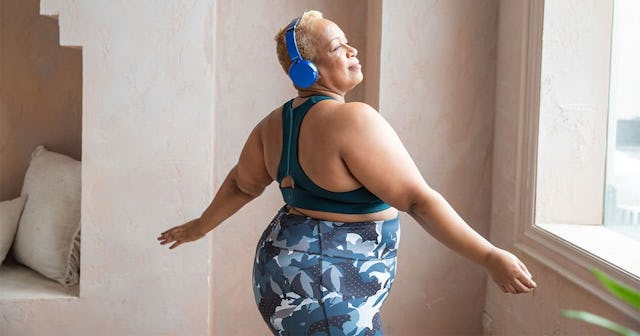It's All Right To Admit You're Not Okay Today

Depression. Anxiety. I’ve typed and deleted those words ten times in the last minute. I don’t want to write about that, but I feel pulled to do so.
I hate the shame that I feel as I type. I hate the way my mind tells me that I’m broken because I struggle. The perfectionist inside doesn’t want anyone to know that some days I just want to stay in bed and hide. My ego doesn’t want people to know that sometimes I can’t catch my breath because the buzzing inside my head and throughout my body is too much.
I tell my truth because so much of the issue around mental health is the stigma linked to it. Humans need connection, and the societal shame associated with these afflictions only produce further isolation. So, I will share my truth, even though I don’t want you to know that I am human.
I was diagnosed with depression and anxiety when I was 15 years old. The façade of a young teen who seemingly had her stuff together held steadily in place. No one knew that I felt suffocated inside of myself. No one knew that I tried to escape myself through anything that gave me that false hope. No one knew that I stayed up all night, unable to settle my nerves and rest. No one knew that I felt a longing to run away from it all. That was part of the problem; masking my truth from the world, acting “as if,” and building an image of a girl who seemed confident only furthered my loneliness.
I have self-medicated through alcohol, drugs, and food. I have attempted to beat my mind and body into submission through extreme control. I have over-indulged and I have punished myself. Clinging to outside sources, I have attempted to find solid ground, not knowing that a firm footing had to happen within me.
I found recovery in 2008. I was 20 years old, beaten, and raw. I have stayed sober since then, facing my demons, healing my traumas, and finding freedom from drugs and alcohol.
Even so, I have still been knocked down by depression at different points in my sobriety. Life happens and circumstances can trigger it. I experienced postpartum depression after my second daughter was born. I have faced old traumas from my past that have sent me into a tailspin. When my three-year-old was hospitalized with a necrotizing pneumonia and empyema, we were not sure she would make it. The trauma of that horrifying experience threw me off a cliff, hitting jagged edges all the way down. Anxiety showed up too. Hand in hand, anxiety and depression flipped and flopped me back and forth.
I have had to ask for help, reach out to close family and friends, and process my pain to get through to the other side. The only way to gain my freedom again was to feel it. I have told the whole truth to people that were safe, loving, and honest. I have fallen apart, scattered across the floor, to pick myself up a little bit stronger than before. In doing so, I have grown in ways I didn’t know I could. In the middle of the pain, when I finally owned it, I emerged different. Transformed.
My mental health is something I work at every day. Like my alcoholism, I have to continue facing it to stay free. Depression, anxiety, and my drinking and using were things I tried to avoid and deny for as long as I could. Spoiler alert for anyone doing this: you can’t simply wish it away.
I am deeply sensitive and overly attuned to my emotions and to the energy of others. I’ve learned to embrace and love this part of myself. This doesn’t make me weak or broken. It just makes me, me. I have learned that sometimes life is not easy. When I accept this fact of life, then I don’t have to suffer in it. I can trust that I will move through, as nothing ever remains the same.
I share all of this because I know that I am not alone. While sheltering in place, our mental health is at risk even more. This experience can be extremely triggering to millions who are prone to depression and/or anxiety. I put myself out there so that others who read this feel a little less isolated.
Saying, “today I don’t feel okay,” takes away the power and it allows the possibility for tomorrow to be a little better; one day at a time.